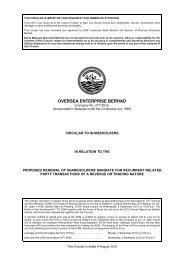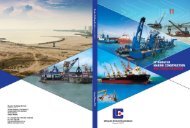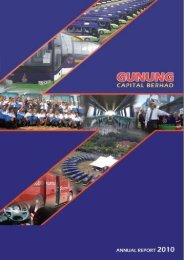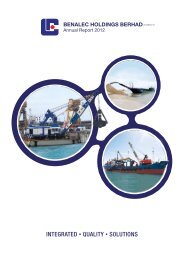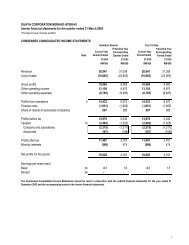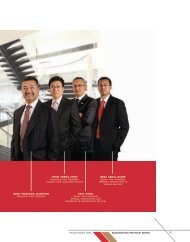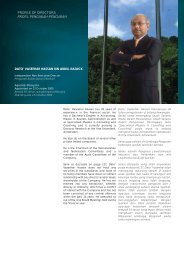Download (PDF) - ChartNexus
Download (PDF) - ChartNexus
Download (PDF) - ChartNexus
You also want an ePaper? Increase the reach of your titles
YUMPU automatically turns print PDFs into web optimized ePapers that Google loves.
2. SIGNIFICANT ACCOuNTING pOlICIES<br />
Masterskill Education Group Berhad / Annual Report 2012<br />
69<br />
NOTES TO THE FINANCIAL STATEMENTS (CONT’D)<br />
The accounting policies set out below have been applied consistently to the periods presented in these financial statements,<br />
and in preparing the opening MFRS statements of financial position of the Group and of the Company at 1 January 2011 (the<br />
transition date to MFRS framework), unless otherwise stated.<br />
(a) Basis of consolidation<br />
(i) Subsidiaries<br />
Subsidiaries are entities, including unincorporated entities, controlled by the Company. The financial statements of<br />
subsidiaries are included in the consolidated financial statements from the date that control commences until the date<br />
that control ceases. Control exists when the Company has the ability to exercise its power to govern the financial and<br />
operating policies of an entity so as to obtain benefits from its activities. In assessing control, potential voting rights that<br />
presently are exercisable are taken into account.<br />
Investments in subsidiaries are measured in the Company’s statement of financial position at cost less any impairment<br />
losses. The cost of investments includes transaction costs.<br />
(ii) Business combinations<br />
Business combinations are accounted for using the acquisition method from the acquisition date, which is the date on<br />
which control is transferred to the Group.<br />
Acquisitions on or after 1 January 2011<br />
For acquisitions on or after 1 January 2011, the Group measures the cost of goodwill at the acquisition date as:<br />
• the fair value of the consideration transferred; plus<br />
• the recognised amount of any non-controlling interests in the acquiree; plus<br />
• if the business combination is achieved in stages, the fair value of the existing equity interest in the acquiree; less<br />
• the net recognised amount (generally fair value) of the identifiable assets acquired and liabilities assumed.<br />
When the excess is negative, a bargain purchase gain is recognised immediately in profit or loss.<br />
For each business combination, the Group elects whether it measures the non-controlling interests in the acquiree<br />
either at fair value or at the proportionate share of the acquiree’s identifiable net assets at the acquisition date.<br />
Transaction costs, other than those associated with the issue of debt or equity securities, that the Group incurs in<br />
connection with a business combination are expensed as incurred.<br />
As part of its transition to MFRS, the Group elected not to restate those business combinations that occurred before<br />
the date of transition to MFRSs, i.e. 1 January 2011. Goodwill arising from acquisitions before 1 January 2011 has been<br />
carried forward from the previous FRS framework as at the date of transition.<br />
(iii) Acquisitions of non-controlling interests<br />
The Group treats all changes in its ownership interest in a subsidiary that do not result in a loss of control as equity<br />
transactions between the Group and its non-controlling interest holders. Any difference between the Group’s share of<br />
net assets before and after the change, and any consideration received or paid, is adjusted to or against Group reserves.







